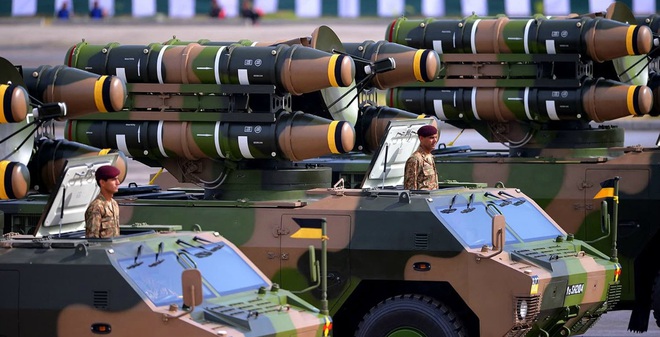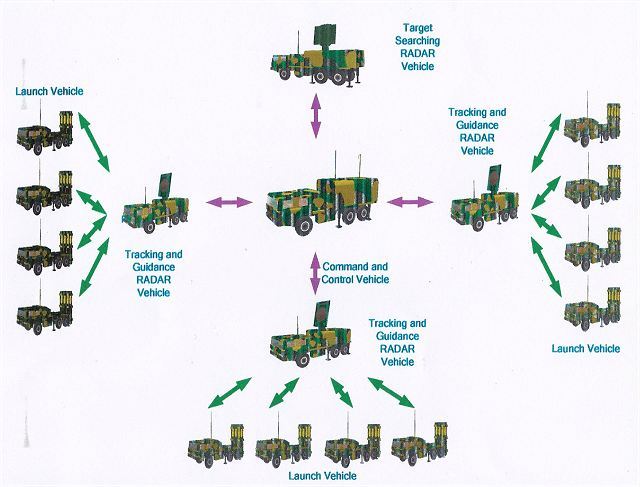FM-90 (HQ-7B) SR-SAM
Analyst Haris Khan of Pakistan Military Consortium think tank has disclosed that Pakistan has formed a new
Integrated Army & Air Force Command to manage air defense operations across the country.
15 systems of LY-80 (HQ-16A) MR-SAM were ordered by the PAF in 2013. All were delivered by August 2016.
Another 15 systems might be ordered by the air force for providing air defense to all of its airfields and other sensitive installations.
PAF already operates Crotale and MBDA Spada 2000 SR-SAM's and HQ-2B MR-SAM.
Pakistan is in advanced talks with CPMIEC for purchasing several systems of the HQ-9 LR-SAM. The feasibility of integrating HQ-16 with HQ-9 SAM system has already been completed.
Pakistan has also completed the feasibility of incorporating FM-90 (HQ-7B) SR-SAM with Chinese CIWS for its Army.
HQ-16A Surface-to-air missile (SAM) system:
HQ-16 SAM
The HQ-16A is a Chinese-made surface-to-air missile defence system which was introduce in the Chinese armed forces in September 2011. This is a land based version of the HQ-16 system used in ships (and fired from VLS (Vertical Launch System) containers. The HQ-16A is based on a joint development of the Russian Buk-M1 (SA-11 'Gadfly') and Ural/Buk-2M (SA-17 'Grizzly') Surface-to-Air Missile (SAM) systems, for use from mobile ground vehicles and later from ships. The HQ-16A is able to engage aerial targets at high altitude; the mid-range HQ-16 is also able to intercept very low-flying targets at a distance of up to about 40 kilometers, filling the gap between the HQ-7 short-range SAM and the HQ-9 long-range SAM systems. The HQ-16A missile can hit targets of an altitude from 400 to 10,000 meters.
Technical Data
Design
The HQ-16A (LY-80) launcher missile system is carried by an 8x8 truck that contains a command and control station behind the cab, and behind those are six firing missile containers in two rows of three. These containers are tilted back so that the missiles can be fired straight up, just as they are from VLS (Vertical launch System) cells. In firing position, the wheels are raised off the ground and the carriage is supported at four points by hydraulic jacks, two at the rear and one on each side.
Missile
The HQ-16A (LY-80) missile can intercept an aerial flying target from an 15 m to 18 km of altitude, while its maximum interception range for combat aircraft is 40 km, and between 3.5 km and 12 km for cruise missiles flying at an altitude of 50 meters at a speed of 300 meters/second. Single-shot kill probability is a claimed figure of 85 per cent against combat aircraft, and 60 per cent against cruise missiles. The missile guidance system is of the composite type, comprising initial independent inertial guidance and intermittent illumination and semi-active homing terminal guidance.
Control and command systems
The HQ16A (LY-80) SAM components comprise a searching radar vehicle, command vehicle, radar tracking and guidance vehicle, launcher unit vehicle, and missiles canister. Technical support equipment includes missile transportation and loading vehicle, power supply vehicle, maintenance vehicle, and missile-test equipment. A single radar guidance vehicle controls two to four launcher units with six missiles ready to launch. The command vehicle is responsible to send target information and combat orders.
The searching radar vehicle is equipped with solid-state S-band 3-D passive phased-array radar mounted on the top of a mast. When the target is detected, the searching radar vehicle performs automatic IFF (Identification Friend-or-Foe), threat judgment, flight path processing and provide target engagement information for the tracking-and-guidance radar. The S-band radar has a range of 140 km and can detect targets flying at an altitude of 20 km.
IBIS150 3D Target Designation Radar
The tracking and guidance radar vehicle performs target acquisition and tracking, and identification of target types. It also controls the missile launching and illuminates the target after the missile is fired. L-band passive phased-array radar is mounted at the rear of the vehicle and has a range of 85 km. The L-band radar can detect up to six targets and track four of them, and provide fire-control/guidance for up to eight missiles.
@Horus @Windjammer @Quwa @Areesh @New Resolve @Oscar














